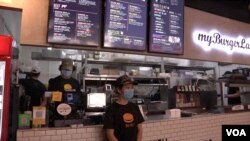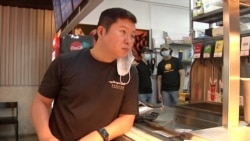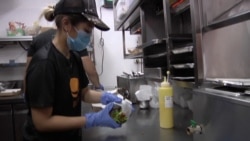Some customers come for the beef burger known as the Hangover topped with hash browns, mushrooms and maple-flavored syrup. Others crave the Juicy Lucy with its cheddar cheese-stuffed patty wrapped with beef bacon.
“This place makes my mouth water,” said Jimmy Chan, after leaving the restaurant with burgers for himself, his wife and two children.
Chin Ren Yi, 39, co-founded myBurgerLab in 2012. He spent his summers as a university student in the United States, where the famed In-N-Out Burger inspired him to open his own burger business, which has grown into a six-branch chain.
“We do have our traditional Western burgers, including a simple cheeseburger,” Chin said. “However, we also play around with creative flavors.”
Behind all the sizzle is concern that this business could soon fizzle. Due to the coronavirus, myBurgerLab, like so many businesses around Malaysia and the world, is dealing with an economic climate that threatens its survival.
Malaysia’s nationwide movement restrictions require restaurants to close by 8 p.m. each night. Chin says the early closing means fewer sales. The restaurant’s tables and chairs are empty because eateries cannot let customers dine in. Patrons can order takeout — more than 90% of myBurgerLab’s orders are for delivery, compared to 35% before movement restrictions were initiated. The delivery companies take a 20%- to 30% commission.
“We are right now 20%- to 30% below the break-even mark,” Chin said. “It basically spells bad news for us.”
The company has already reduced costs. Senior managers took pay cuts ranging from 10- to 25%. Chin said since the movement restrictions started last month, about half of his 200 part-time hourly employees — mostly university students — have chosen not to work. To keep the restaurants open, full-timers from the back office are dividing their time between working from home and helping out in the branches.
“We have our finance people, our operation guys, even HR people working on the ground,” Chin said. “Either doing cashiering, doing griddle — which is flipping burgers or assembling burgers.”
Under ordinary circumstances, finance manager Cassandra Poon would calculate numbers and push papers on her desk. On a recent afternoon, however, she was behind the counter, taking customer orders.
“I repeat your order,” Poon said. “One Juicy Lucy, awesome fries and one soda.”
She was also in the kitchen placing lettuce on buns while waiting for the burgers to finish cooking.
“I would say compared to working in the office and working in the store — (the) office would mentally stress you out,” Poon said. “But in the store, it’s physically stressing you out.”
A Malaysian government stimulus program will pay part of the salaries for some of the restaurant’s full-time staff. The company took out a low-interest loan as well. Despite this, unless there is a significant boost to the bottom line, Chin said his restaurants might go out of business.
“So, if everything stays status quo, right now we can probably survive until late May or early June,” he said.
Chin said the business would be losing less money now if he closed all his shops and just paid the rent.
Chin said he decided to remain open because "We still have people to take care of. We still need to give it a fight. Eight years is a lot of hard work. While we still have ammunition, we should continue to fight,” he said.









